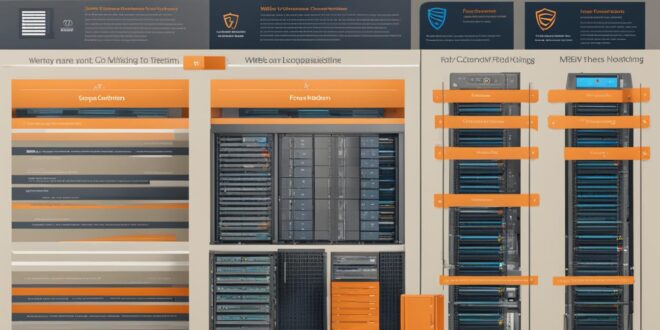When it comes to building a website, choosing the right web host is a crucial decision that can impact its performance and success. With so many web hosting services available, it can be overwhelming to determine which one is best for your needs. In this article, we will explore the key factors to consider when choosing a web host, including website needs, uptime and stability, plan flexibility, pricing structures, essential features, backups, customer support, and server speed.
Key Takeaways:
- Identify your website needs, such as the type of website and expected traffic.
- Ensure high uptime and stability with a reliable web host.
- Choose a host that offers the flexibility to upgrade your hosting plan as your website grows.
- Understand the pricing structures and renewal rates of different web hosting providers.
- Utilize refund policies and free trials to test the hosting plan before committing.
Identifying Your Website Needs
The first step in choosing a web host is to identify your website needs. Consider the type of website you are building, whether you want to use WordPress, and the amount of traffic you are expecting. This information will help you determine which hosting provider is the right fit for your specific requirements. For beginners, shared hosting plans with trusted companies are recommended as they are affordable and easy to maintain.
Ensuring Uptime and Stability
When selecting a web host for your website, one of the primary considerations should be the uptime and stability provided by the hosting provider. A stable and reliable web host ensures that your website remains online and accessible to visitors consistently.
To ensure minimal disruptions, look for web hosts that offer uptime scores of at least 99.95%. This means that the web host guarantees that your website will be available and accessible to visitors for 99.95% of the time. Premium accounts may even offer higher uptimes, providing enhanced stability for your website.
To assess a web host’s stability, you can use monitoring tools that track the performance and uptime of the hosting provider’s servers. However, checking their uptime scores alone is often sufficient to determine their reliability. The uptime score represents the percentage of time the servers have been up and running without any downtime or interruptions.
By choosing a web host with high uptime scores, you can ensure that your website remains consistently online, providing a seamless experience for your visitors. This stability is crucial, especially for businesses that rely heavily on their websites to generate leads, drive sales, or provide valuable information to their audience.
Flexibility to Upgrade Your Hosting Plan
If you are starting with a shared hosting plan, it is important to choose a provider that allows you to upgrade your server as your website grows.
Shared hosting plans have limitations on resources, and as your site attracts more traffic, you may need to upgrade to a VPS or dedicated server plan.
Having the flexibility to scale up within the same hosting provider will save you the hassle of migrating your website to a new host.
Understanding Pricing Structures and Renewal Rates
When comparing web hosting providers, it is essential to understand their pricing structures and renewal rates. Many hosting companies offer lower introductory prices, but the renewal rates might be significantly higher. It is important to review the terms of service to find information on renewal rates.
When evaluating pricing structures, look for providers that offer reasonable price increases upon renewal, ideally not exceeding 100%. Some hosting companies implement substantial price jumps, which can impact your budget in the long term.
Renewal rates can vary between providers, and it’s worth considering how they fit into your overall cost calculations. Some hosting companies might offer low initial prices to attract new customers but significantly increase the rates when it comes time to renew your hosting plan.
To make an informed decision, carefully review the pricing details and terms of service from different web hosting providers. Look for providers that offer transparency and clarity regarding their pricing structures and renewal rates.
It’s also important to consider the value you are getting for the price. Compare the features, resources, and support offered by different providers to determine if their pricing aligns with your needs and expectations.
Understanding the pricing structures and renewal rates will help you choose a web hosting provider that offers competitive pricing and aligns with your long-term budget. Make sure to consider this important factor alongside other criteria to select the best web host for your website.
Utilizing Refund Policies and Free Trials

To reduce costs and ensure satisfaction, it is crucial to consider web hosting providers that offer refund policies and free trial periods. These options allow you to test the hosting plan and determine if it aligns with your website needs and expectations. By taking advantage of these opportunities, you can make an informed decision based on firsthand experience.
When evaluating hosting providers, look for those that offer money-back guarantees and prorated refunds after the trial period. This ensures that you have the opportunity to request a refund if the service does not meet your expectations. Avoid providers that charge cancellation fees during the trial period, as this can add unnecessary costs and hinder your ability to explore other options.
Utilizing refund policies and free trials allows you to assess various aspects of the hosting service, such as the user interface, performance, customer support, and overall reliability. It provides an opportunity to test the speed and responsiveness of the web server, evaluate the availability of essential features, and gain insights into the quality of the service before making a commitment.
During the trial period, be proactive in exploring the hosting provider’s refund policy and testing the features and functionalities that are important to your website’s needs. Take note of any limitations or restrictions that may influence your decision. By doing so, you can confidently select a web hosting provider that not only meets your requirements but also offers excellent customer support and value for your investment.
It’s important to remember that refund policies and free trials vary among web hosting providers, so take the time to read the terms and conditions to fully understand the specifics of each offer.
Essential Features to Consider

When choosing a web host, it’s important to take into account the essential features that can greatly impact your website’s performance and functionality. Three key features to consider are:
- One-Click Installer: A one-click installer simplifies the process of installing popular applications like WordPress, Drupal, or Joomla. With just a few clicks, you can have these powerful platforms up and running on your website, saving you time and effort.
- File Manager: Having access to a comprehensive file manager is crucial for efficient file management on the server. It allows you to easily upload, edit, and organize your website files, ensuring seamless updates and maintenance.
- DNS Management: DNS (Domain Name System) management is essential for controlling and configuring your website’s domain settings. It enables you to easily manage DNS records, such as adding or editing A, CNAME, and MX records, to ensure smooth domain propagation and proper functioning of your website.
These features provide you with the necessary tools to simplify website setup, manage your files effectively, and maintain control over your domain settings. By choosing a web host that offers these essential features, you can enhance your website’s performance and overall user experience.
Incorporate Essential Features for a Seamless Website Experience
“With a one-click installer, you can easily install popular applications like WordPress, Drupal, or Joomla, empowering you to build dynamic websites effortlessly. The file manager gives you the freedom to manage your website’s files with ease, allowing for seamless updates and maintenance. Additionally, DNS management ensures optimal domain configuration and smooth website functioning.”
Considerations for Disk Space and Data Transfer Capacity

In the beginning stages of your website, disk space and data transfer capacity may not be major concerns, especially for smaller websites. Most shared hosting plans offer sufficient resources for smaller sites, allowing you to focus on other crucial factors for your website’s success.
When starting out, it is important to prioritize factors such as server resources and speed. These aspects play a significant role in ensuring your website performs well and provides a smooth user experience. A fast-loading website is not only beneficial for your visitors but also contributes to better SEO rankings.
Third-Party Storage and Bandwidth Solutions
To address any storage and bandwidth needs, you can leverage third-party platforms specifically designed to handle the storage and delivery of images, videos, and documents. These platforms offer scalable and reliable solutions, allowing you to focus on your website’s core functionalities.
By offloading these resources to dedicated platforms, you can optimize your website’s performance without worrying about limited disk space or data transfer capacity. It also gives you the flexibility to choose from various plans that suit your needs and budget.
One such option is the use of content delivery networks (CDNs), which store and distribute your website’s content across multiple servers worldwide. CDNs improve your website’s load times by serving content from the server closest to the user’s location, reducing latency and enhancing the overall user experience.
Overall, while disk space and data transfer capacity become more crucial as your website grows, starting with shared hosting plans and utilizing third-party solutions for storage and bandwidth can alleviate these concerns and allow you to focus on other key aspects of your website’s development.
Remember, as your website evolves and attracts more traffic, it’s important to stay attentive to your disk space and data transfer needs. Regularly assess your requirements and opt for hosting plans or additional services that can accommodate your growing demands.
Importance of Backups

Website backups are essential for maintaining the security and integrity of your online presence. In the event of crashes, failures, viruses, or hacks, having a reliable backup can mean the difference between a minor setback and a major disaster.
When choosing a web host, it is crucial to consider their backup policy. Look for a hosting provider that offers regular full backups of your website. This ensures that you have a complete copy of your data, files, and configurations that can be restored if needed.
Check if the backups are performed manually or automatically. Manual backups require you to initiate the process, while automatic backups are scheduled and performed by the web host. Automatic backups are convenient because they ensure regular and consistent backup copies of your website.
It is also important to know if you have the capability to restore the backup files yourself or if you need assistance from the support staff. In some cases, web hosts provide user-friendly interfaces or tools that allow you to restore your backups with ease. Having control over the restoration process gives you the flexibility and peace of mind to quickly recover your website.
Minimal downtime during the restoration process is desirable. Choosing a web host that prioritizes quick and efficient restoration will help minimize any disruption to your website’s availability and user experience.
Why Backups Are Important
Backups provide a safety net for your website, ensuring that even in the face of unforeseen circumstances, you can quickly recover your data and get back online. They are a critical part of any website’s security and maintenance strategy.
By regularly backing up your website, you protect yourself from potential data loss, costly downtime, and the frustration of rebuilding your site from scratch. Backups give you the ability to roll back to a previous version of your site, maintaining its integrity and ensuring that your users can access the content they expect.
Remember, accidents happen, and threats to your website’s security are ever-present. By investing in a web host with a robust backup policy, you are proactively safeguarding your online presence and giving yourself peace of mind.
Having a reliable backup system is an essential aspect of protecting your website and your business. Consider the backup policy of your web host carefully to ensure that your valuable data and content are always secure.
Quality of Customer Support

A reliable customer support team is crucial for resolving issues and ensuring quick resolutions. When choosing a web hosting provider, it is important to prioritize one that offers responsive customer support. Look for providers that offer live chat or telephone support, allowing you to get immediate assistance when needed.
Researching customer reviews and ratings is also a valuable step in gauging the quality of a hosting provider’s support team. By reading about other customers’ experiences, you can get a sense of how responsive and helpful the support team is and make an informed decision.
Having a support team that can quickly resolve website issues is crucial for maintaining a seamless user experience. Whether it’s a technical glitch or a question about your hosting plan, having a responsive customer support team ensures that you can get the assistance you need in a timely manner, minimizing any potential disruptions to your website.
Server Speed and Responsiveness

Fast loading speeds are crucial for a seamless user experience and improved SEO rankings. When choosing a web host, it is important to prioritize server speed and responsiveness to ensure optimal website performance.
One way to assess a web host’s server speed is by using tools like Bitcatcha and WebpageTest. These tools can test the time to first byte (TTFB) and measure server responsiveness, providing valuable insights into a hosting provider’s performance.
By selecting a web host that prioritizes server speed, you can ensure that your website loads quickly and efficiently, preventing users from experiencing frustrating delays. Server responsiveness also plays a significant role in delivering a smooth browsing experience, allowing visitors to navigate your site seamlessly.
To further enhance server speed, it is beneficial to choose a web host that utilizes high-quality hardware and state-of-the-art infrastructure. This ensures that the hosting servers can handle high volumes of traffic without compromising performance.
Optimizing server speed and responsiveness not only leads to improved user satisfaction but also contributes to higher SEO rankings. Search engines like Google consider website loading speed as a ranking factor, rewarding faster websites with better visibility in search results.
By prioritizing server speed and responsiveness, you can provide a smooth and efficient browsing experience for your website visitors, ultimately enhancing your website’s performance and SEO rankings.
Taking Time to Choose the Right Web Hosting Provider

When it comes to choosing a web hosting provider, it’s crucial to take the time to consider all the factors that can have a significant impact on the success of your website. Rushing into a decision without proper evaluation can lead to poor performance, downtime, and a host of other issues that can negatively affect your online presence.
To ensure you make the right choice, it’s important to evaluate your specific website needs. Consider the type of website you are building, the amount of traffic you expect, and whether you plan to use WordPress or other applications. Understanding these requirements will help you narrow down your options and find a provider that caters to your specific needs.
Another crucial factor to consider is the uptime and stability of the web hosting provider. You want to ensure that your website stays online with minimal disruptions. Look for providers with high uptime scores, preferably around 99.95% or higher. This ensures that your website will be accessible to your visitors consistently and reliably.
In addition, assess the flexibility and scalability of the hosting plans offered by different providers. As your website grows, you may need to upgrade your hosting plan to accommodate increased traffic and resource requirements. Choosing a provider that allows for easy plan upgrades will save you the hassle of migrating your website to a new host in the future.
Understanding the pricing structures and renewal rates is another important consideration. While introductory prices may be appealing, it’s essential to look beyond them and consider the long-term costs. Take into account the renewal rates and any hidden fees that may be associated with the hosting plans. Make sure to choose a provider with transparent pricing and reasonable renewal rates.
Exploring refund policies and free trial periods can also be beneficial. These allow you to test out the hosting services and assess whether they meet your expectations. Look for providers with money-back guarantees and prorated refunds after the trial period. Avoid providers that impose cancellation fees during the trial period.
Lastly, carefully review the features offered by each web hosting provider. Look for essentials like a one-click installer for easy application installations, a file manager for convenient file management, and DNS management for hassle-free domain management. These features can greatly enhance your website management experience and save you time and effort.
Remember, choosing a web hosting provider is a decision that should not be rushed. Take the time to evaluate your needs, check uptime and stability, assess plan flexibility, understand pricing structures, explore refund policies and free trial periods, and review the features offered by each provider. By doing so, you can make an informed decision and select the right web hosting provider that aligns with your specific requirements.
Other Factors to Consider in Choosing a Web Host
While the factors mentioned above are crucial in choosing a web host, there may be other considerations specific to your business. Research and ask questions about additional factors that are important to your website’s needs. Consider factors like data security compliance, the ability to host other parts of your business, and the availability of value-added services and benefits.
Summary of Key Factors in Choosing a Web Host

To summarize, when choosing a web host, it is important to consider the following key factors:
- Understand Your Website Needs: Identify the type of website you are building, determine if you need WordPress hosting or shared hosting, and estimate the expected traffic volume.
- Ensure Uptime and Stability: Look for web hosts with high uptime scores of at least 99.95% to minimize website disruptions.
- Consider Plan Flexibility and Scalability: Choose a provider that allows you to easily upgrade your hosting plan as your website grows in size and attracts more traffic.
- Understand Pricing Structures and Renewal Rates: Review and compare the pricing structures of different providers, keeping in mind the renewal rates to avoid unexpected cost increases.
- Utilize Refund Policies and Free Trials: Take advantage of providers that offer refund policies and free trial periods to test their services before committing.
- Evaluate Essential Features: Look for hosts that offer important features like one-click installers, file managers, and DNS management to streamline website management.
- Prioritize Backups and Customer Support: Select a host that prioritizes regular backups and provides reliable customer support to address any issues or concerns promptly.
- Assess Server Speed and Responsiveness: Opt for a host that offers fast server speeds to enhance user experience and improve search engine rankings.
Each of these factors plays a vital role in choosing the right web hosting provider for your business. Take the time to carefully evaluate and compare options to make an informed decision that aligns with your website’s specific requirements.
Conclusion
Choosing the right web host is a critical decision that significantly impacts the performance and success of your website. To make an informed choice, consider various factors like your website’s needs, uptime and stability, flexibility and scalability, pricing structures, essential features, backup options, customer support quality, and server speed. By carefully evaluating these web hosting factors, you can select a provider that aligns with your specific requirements and goals.
It is crucial to conduct thorough research and compare different web hosting options before finalizing your decision. Understanding your website’s needs and future growth potential helps determine the appropriate hosting plan, such as shared hosting or WordPress hosting. Ensuring uptime and stability is vital to minimize disruptions and maintain a seamless user experience.
Consider the flexibility to upgrade your hosting plan as your website grows, keeping scalability in mind. Evaluate the pricing structures, checking for affordable introductory rates and reasonable renewal rates. Utilize refund policies and free trials to test the hosting services and confirm if they suit your needs. Pay attention to essential features like one-click installers, file management tools, and DNS management to streamline website management.
Backup policies and options for data recovery are essential for website security and minimizing downtime during restoration. Choose a web host with reliable customer support that offers responsive assistance. Finally, prioritize server speed and responsiveness to ensure optimal loading times and user experiences. By carefully considering these web hosting factors, you can choose the right provider and set your website up for success.
FAQ
What factors should I consider when choosing a web host?
It is important to consider your website needs, uptime and stability, plan flexibility, pricing structures, refund policies and free trial periods, essential features, backups, customer support, and server speed.
How can I identify my website needs?
Consider the type of website you are building, whether you want to use WordPress, and the amount of traffic you are expecting.
Why is uptime and stability important for a web host?
Uptime and stability ensure that your website stays online with minimal disruptions. Look for web hosts with uptime scores of at least 99.95%.
Why is plan flexibility important?
Plan flexibility allows you to upgrade your hosting plan as your website grows. This saves you the hassle of migrating your website to a new host.
How should I understand pricing structures and renewal rates?
Compare the introductory prices and the renewal rates of hosting providers. Look for reasonable price jumps, ideally not exceeding 100%, and check the terms of service for information on renewal rates.
How can I utilize refund policies and free trials?
Look for providers with money-back guarantees and prorated refunds after the trial period. Avoid providers that charge cancellation fees during the trial period.
What are essential features to consider in a web host?
Look for features like one-click installers, file managers, and DNS management tools. These simplify the website setup process and allow for easy file management on the server.
Should I be concerned about disk space and data transfer capacity?
For smaller websites, disk space and data transfer capacity are not major concerns. Most shared hosting plans offer sufficient resources. Focus on other factors like server resources and speed.
Why are backups important in a web host?
Backups ensure website security and allow for easy recovery in the event of crashes, failures, viruses, or hacks. Choose a web host with a good backup policy that allows for regular full backups.
How important is the quality of customer support?
A reliable customer support team is crucial for resolving issues and ensuring quick resolutions. Look for web hosting providers that offer responsive support through live chat or telephone.
Why is server speed and responsiveness important?
Fast loading speeds are vital for user experience and SEO rankings. Choose a web host that can offer stable and fast server speeds to ensure smooth website performance.
Should I take my time in choosing the right web hosting provider?
Yes, take the time to consider all the factors mentioned above. Your choice of web hosting provider can have a significant impact on your website’s success. Evaluate your website needs, check uptime and stability, assess plan flexibility, understand pricing structures, explore refund policies and free trial periods, and review the features offered by each provider.
Are there other factors to consider in choosing a web host?
Yes, research and ask questions about factors specific to your business, such as data security compliance, the ability to host other parts of your business, and the availability of value-added services and benefits.
What are the key factors to consider when choosing a web host?
The key factors to consider include understanding your website needs, ensuring uptime and stability, considering plan flexibility and scalability, understanding pricing structures and renewal rates, utilizing refund policies and free trials, evaluating essential features, prioritizing backups and customer support, and assessing server speed and responsiveness.
How can I make an informed decision in choosing a web host?
By considering factors like website needs, uptime, flexibility, pricing, features, backups, support, and server speed, you can make an informed decision and choose a web hosting provider that aligns with your specific requirements. Take the time to research and compare different options to ensure the best outcome for your website and business.
How important is choosing the right web host for my business?
Choosing the right web host is crucial as it can greatly impact your website’s performance and success. By considering various factors and making an informed decision, you can ensure a seamless user experience and maximize your website’s potential.
 Sharing is Caring Blog Something different…
Sharing is Caring Blog Something different…









